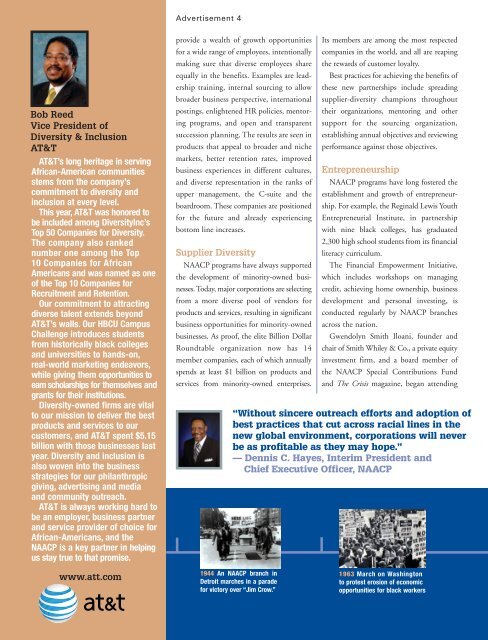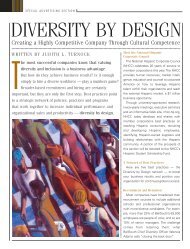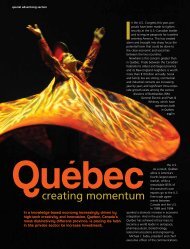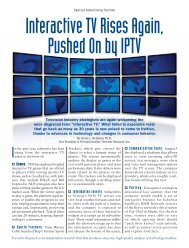African-American Business Legacy - Forbes Special Sections
African-American Business Legacy - Forbes Special Sections
African-American Business Legacy - Forbes Special Sections
Create successful ePaper yourself
Turn your PDF publications into a flip-book with our unique Google optimized e-Paper software.
Advertisement 4Bob ReedVice President ofDiversity & InclusionAT&TAT&T’s long heritage in serving<strong>African</strong>-<strong>American</strong> communitiesstems from the company’scommitment to diversity andinclusion at every level.This year, AT&T was honored tobe included among DiversityInc’sTop 50 Companies for Diversity.The company also rankednumber one among the Top10 Companies for <strong>African</strong><strong>American</strong>s and was named as oneof the Top 10 Companies forRecruitment and Retention.Our commitment to attractingdiverse talent extends beyondAT&T’s walls. Our HBCU CampusChallenge introduces studentsfrom historically black collegesand universities to hands-on,real-world marketing endeavors,while giving them opportunities toearn scholarships for themselves andgrants for their institutions.Diversity-owned firms are vitalto our mission to deliver the bestproducts and services to ourcustomers, and AT&T spent $5.15billion with those businesses lastyear. Diversity and inclusion isalso woven into the businessstrategies for our philanthropicgiving, advertising and mediaand community outreach.AT&T is always working hard tobe an employer, business partnerand service provider of choice for<strong>African</strong>-<strong>American</strong>s, and theNAACP is a key partner in helpingus stay true to that promise.provide a wealth of growth opportunitiesfor a wide range of employees, intentionallymaking sure that diverse employees shareequally in the benefits. Examples are leadershiptraining, internal sourcing to allowbroader business perspective, internationalpostings, enlightened HR policies, mentoringprograms, and open and transparentsuccession planning. The results are seen inproducts that appeal to broader and nichemarkets, better retention rates, improvedbusiness experiences in different cultures,and diverse representation in the ranks ofupper management, the C-suite and theboardroom. These companies are positionedfor the future and already experiencingbottom line increases.Supplier DiversityNAACP programs have always supportedthe development of minority-owned businesses.Today, major corporations are selectingfrom a more diverse pool of vendors forproducts and services, resulting in significantbusiness opportunities for minority-ownedbusinesses. As proof, the elite Billion DollarRoundtable organization now has 14member companies, each of which annuallyspends at least $1 billion on products andservices from minority-owned enterprises.Its members are among the most respectedcompanies in the world, and all are reapingthe rewards of customer loyalty.Best practices for achieving the benefits ofthese new partnerships include spreadingsupplier-diversity champions throughouttheir organizations, mentoring and othersupport for the sourcing organization,establishing annual objectives and reviewingperformance against those objectives.EntrepreneurshipNAACP programs have long fostered theestablishment and growth of entrepreneurship.For example, the Reginald Lewis YouthEntrepreneurial Institute, in partnershipwith nine black colleges, has graduated2,300 high school students from its financialliteracy curriculum.The Financial Empowerment Initiative,which includes workshops on managingcredit, achieving home ownership, businessdevelopment and personal investing, isconducted regularly by NAACP branchesacross the nation.Gwendolyn Smith Iloani, founder andchair of Smith Whiley & Co., a private equityinvestment firm, and a board member ofthe NAACP <strong>Special</strong> Contributions Fundand The Crisis magazine, began attending“Without sincere outreach efforts and adoption ofbest practices that cut across racial lines in thenew global environment, corporations will neverbe as profitable as they may hope.”— Dennis C. Hayes, Interim President andChief Executive Officer, NAACPwww.att.com1944 An NAACP branch inDetroit marches in a paradefor victory over “Jim Crow.”1963 March on Washingtonto protest erosion of economicopportunities for black workers














